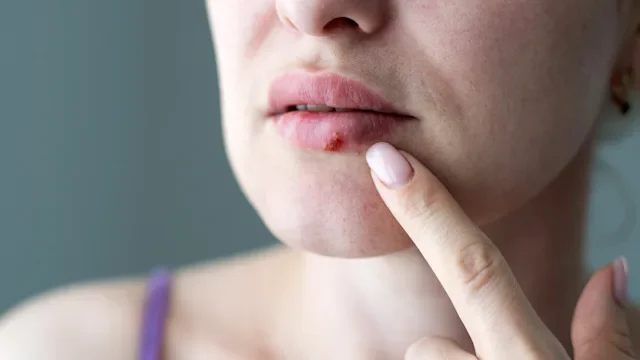Key takeaways:
Most people with herpes never develop symptoms. You can live with herpes for decades and not know you have it.
You can pass the herpes virus to other people even if you don’t have any symptoms.
There’s no cure for herpes. Medications can keep you from having outbreaks and lower the chance of passing the virus to other people.
The herpes simplex virus (HSV) is a virus that’s responsible for oral and genital herpes outbreaks. Both HSV-1 and HSV-2 can cause painful sores or blisters to develop in and around the mouth and genitals, including the penis, vagina, and anus.
People usually find out they have herpes because they develop these painful sores and blisters. But sometimes the herpes virus doesn’t cause any symptoms. Here’s how long you can have herpes without knowing it.
Can you have herpes without knowing it?
Yes. In fact, it’s estimated that up to 90% of people with herpes don’t know they have it.
Search and compare options
Most people with herpes don’t experience any symptoms. The virus lives inside their bodies, hiding inside nerve cells where the immune system cannot find it. The virus doesn’t cause any harm or symptoms.
That’s why statistics about herpes can often come as a surprise. For example, experts estimate 2 out of every 3 adults has HSV-1. About 1 out of every 6 adults in the U.S. has HSV-2.
That’s billions of people. The majority of them never develop any symptoms and never know they have herpes.
There are blood tests that can help diagnose herpes. But they aren’t always reliable. That’s part of the reason why testing isn’t recommended unless someone has symptoms.
Herpes and sex: Just because your partner has herpes doesn’t mean you’ll get it, too. Here’s what science says about the chances of passing herpes through different types of sex.
What’s it like to have herpes? Three people share their story.
Not sure if you have genital herpes? Here are common genital herpes signs to look for.
How long can herpes be dormant?
It’s possible for herpes to be dormant for decades.
You carry the herpes virus for years and never develop symptoms. The truth is, most people live their entire lives without knowing they have herpes because they never have any symptoms.
- ValtrexValacyclovir
- ZoviraxAcyclovir
- FamciclovirGeneric Famvir
Some people aren’t as fortunate and develop symptoms — or outbreaks — several times a year. But most people only experience outbreaks once in a while. Herpes outbreaks naturally happen less often over time and it’s not uncommon for years to pass between outbreaks.
Certain things can trigger HSV, like stress, illness, and injuries. But that’s not enough to explain why some people develop symptoms while others don’t. Researchers are trying to pinpoint the reasons why some people stay free of symptoms. Teasing out these reasons may help researchers develop new treatments and even a cure for herpes.
Can you pass herpes to others if you never have symptoms?
Yes. It’s possible to pass the herpes virus to another person even if you don’t have symptoms, like sores or blisters.
This is because of a process called asymptomatic shedding. During asymptomatic shedding, the virus copies itself, and the copies are able to leave the body and pass to another person.
People with HSV aren’t constantly shedding the virus. But it’s not completely clear how often people shed the virus. Shedding patterns may be different for HSV-1 and HSV-2. And people may shed more virus immediately after having an outbreak.
It’s likely that people who never develop herpes symptoms also shed the virus. But it’s not clear how often this happens.
Is herpes curable?
There’s no cure for herpes. But there are medications that can help. Antiviral medications can lower your chances of experiencing a herpes outbreak. Some people totally stop having outbreaks once they start taking medication.
Antiviral medication also lowers rates of asymptomatic shedding. So taking antiviral medications also lowers the chance of passing herpes to other people.
Antiviral medications for herpes include:
These medications are taken by mouth once or twice a day to stop herpes outbreaks.
The bottom line
Many people living with herpes never develop any symptoms. It’s possible to have herpes for decades and not know it. Some people never develop symptoms and never find out they have herpes. It’s possible to pass herpes to others even if you don’t have symptoms. Daily antiviral medication can prevent outbreaks. It can also lower the chances of passing herpes to someone else.

Why trust our experts?


References
Centers for Disease Control and Prevention. (2022). Genital herpes.
Centers for Disease Control and Prevention. (2024). About genital herpes.
El Sahly, H. M. (2022). Patterns of viral shedding after first-time genital HSV-1 infection. New England Journal of Medicine Journal Watch.
Erlich, K. S. (1997). Management of herpes simplex and varicella-zoster virus infections. Topics in Primary Care Medicine.
Mertz, G. J. (2008). Asymptomatic shedding of herpes simplex virus 1 and 2: Implications for prevention of transmission. The Journal of Infectious Diseases.
Miller, C. S., et al. (2008). Asymptomatic shedding of herpes simplex virus (HSV) in the oral cavity. Oral Surgery, Oral Medicine, Oral Pathology, Oral Radiology, and Endodontology.
National Institutes of Health. (2010). Herpes in hiding.
National Institutes of Health. (2023). Strategic plan for herpes simplex virus research. U.S. Department of Health and Human Services.
Planned Parenthood. (2023). STD awareness: Asymptomatic shedding of herpes.
U.S. Preventive Services. (2023). Genital herpes infection: Serologic screening.
Whitley, R. J., et al. (2022). Shedding patterns of genital herpes simplex virus infections. Journal of the American Medical Association.
Zhu, S., et al. (2021). Pathogenesis and virulence of herpes simplex virus. Virulence.














